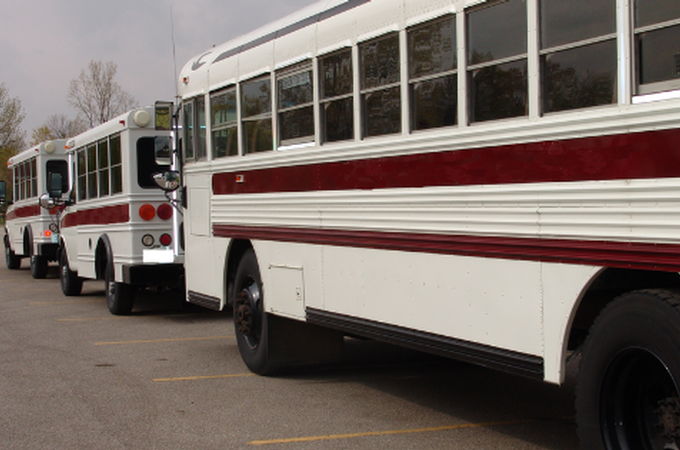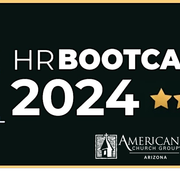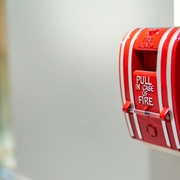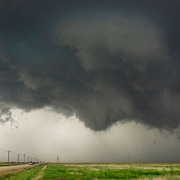Vehicle Registration Guidelines for Ministries
April 8, 2019

Do you use commercial vehicles that transport more than 15 passengers or carry cargo from one state to another as part of your ministry? If so, you are required to register with the Federal Motor Carrier Safety Administration (FMCSA) and obtain a USDOT number. This allows the USDOT to monitor the safety and management practices of the organization through safety audits, compliance reviews, and roadside inspections.
Brotherhood Mutual offers additional risk management information regarding ministry vehicles:
When a ministry needs a larger vehicle to do its work—a van, truck, or bus—along with the greater capacity comes greater registration responsibilities and insurance coverage requirements.
Any organization operating a commercial vehicle that transports passengers or carries cargo, including hazardous materials, must have a United States Department of Transportation (USDOT) number. This unique identifier allows the USDOT to monitor the safety and management practices of the organization through safety audits, compliance reviews, and roadside inspections. Organizations that offer “for hire” transport of passengers or cargo across state lines need a Motor Carrier (MC) number.
When is a USDOT Number Needed?
A USDOT number is needed if the ministry owns a vehicle that will be used to travel across state lines and has at least one of the following characteristics:
- The gross vehicle weight rating is greater than 10,000 pounds. This information can usually be found on a sticker located on the driver’s side door jamb.
- The vehicle is designed or used to transport more than eight passengers, including the driver, for compensation.
- The vehicle is designed or used to transport more than 15 passengers, including the driver, and is not used to transport passengers for compensation.
- The vehicle is used to transport hazardous material.
Some states require commercial vehicles to have a USDOT number regardless of whether or not they cross state lines. Learn more about the requirements for a USDOT number from the Federal Motor Carrier Safety Administration (FMCSA), or contact your state department of motor vehicles for more information. To obtain a USDOT number, visit the U.S. Federal Motor Carrier Safety Administration and complete form MCS-150.
When is an MC Number Needed?
An MC number is required on vehicles operated as “for hire” carriers. A “for hire” carrier transports goods or passengers for compensation or for the benefit of a commercial enterprise. For churches, this most likely does not include transporting individuals who contribute money to defer the cost of transportation.
An MC number is obtained by registering a form OP-1 with the U.S. Federal Motor Carrier Safety Administration.
Proof of Liability Coverage for USDOT and MC Numbers
Most states require vehicle operators to provide proof of financial responsibility. Typically, the proof of coverage cards received in an insurance policy satisfy this requirement.
Organizations with vehicles that have an MC number are also required to keep a form MCS-90 in the vehicle. This form is issued by the insurance company. Brotherhood Mutual can provide assistance to any policyholder who needs a copy.
If you have any questions about insurance coverage or requirements for ministry vehicles, please feel free to contact us or reach out to your local agent directly.
- January 4, 2024
- Join us for a Ministry HR Bootcamp!
-

-
As fun as an Oscar party and as educational as a seminary course, HR Bootcamp takes the confusion out of human resources in ministry.
- November 7, 2023
- Stop Plumbing Leaks with FloLogic
-

-
Water and the damage it brings can be one of the most devastating property claims a ministry or organization can experience. Fortunately, there's a solution that identifies leaks when they start, as small as 1/2-ounce-per-minute. It's called FloLogic.
- September 7, 2023
- Increasing Donor Trust
-

-
The ability to inspire others to give is a blessing. Because fundraising can be both exciting and challenging, there are some important details to consider that can help your donors, and organization, have a smooth and successful experience.
- July 31, 2023
- What to Know About Loaning Your Ministry Vehicle
-

-
Has your church or school ever been asked to loan or rent one of your vans or buses to another ministry? Rather than running the risk of loaning or renting your own vehicle, you could consider aiding them financially in renting or chartering a vehicle from a rental agency.
- March 14, 2023
- Responding to Mission Issues
-

-
Having insurance coverage specifically designed for long-term international missions helps protect your people and organization from the financial impact caused by injuries, lawsuits, property damage, and more.
- January 27, 2023
- Brotherhood Mutual Foundation Kingdom Advancing Grant
-

- January 9, 2023
- Better Achieve Your Mission in 2023
-

- November 10, 2022
- Evaluate Your Ministry's Fire Safety Plan
-

-
With the holiday season right around the corner, it’s wise for ministries to evaluate their fire safety plan. Whether your ministry is hosting a holiday party, prepping treats for charity, or running a community kitchen, make sure you’re well-prepared with these tips.
- September 9, 2022
- School is Back in Session
-

-
As school is back in session, it’s important to make sure your school is equipped with the correct safety procedures. Thinking about your school’s physical security as a series of layers can help you find gaps in your plan. Transportation and volunteers are just two important aspects of your school safety plan to think about.
- July 15, 2022
- Shepherding Ministries in a Time of Change
-

-
Anyone who turns on the news, flips through a magazine, or browses the web can see that American society and culture are experiencing rapid transitions. Some ministries have valid concerns that issues surrounding societal shifts may expose them to negative publicity, governmental scrutiny, or litigation.
The questions become: when and how can ministries operate within their deeply held religious beliefs when they may conflict with others’ rights?
- May 18, 2022
- Five Common Tricks of Cyber Scammers
-

-
Cyber security is increasingly crucial in our technologically advanced world. Scammers use many schemes when attempting to steal your data, but you can outsmart them by understanding their methods.
- July 22, 2021
- Thousands in Relief Funding Available to Ministries Through the Employee Retention Credit
-

-
Most ministry leaders don’t realize there is funding available to non-profit employers including churches, schools, colleges, and camps. This post includes some highlights about the credit and guidance on where to start to see if your ministry is eligible.
- March 16, 2021
- Take Time to Review Your Ministry's Child Protection Plan
-

-
April is National Child Abuse Prevention Month. Though child abuse may not be something you could ever imagine happening within your ministry, sexual abuse of a minor is one of the top five reasons churches end up in court, according to Church Law & Tax. Studies also show that a child is much more likely to be sexually abused by a trusted adult than a stranger.
- March 16, 2021
- Prepare for Severe Spring Storms Now
-

-
When severe storms strike, they can produce high winds and tornadoes. Damaging winds can wreak havoc on your ministry’s property and to buildings. A high wind event can crash debris through your windows, strip your siding, down trees on your parking lot, peel shingles off your roof, and fling back the flashing.
- February 25, 2021
- Catalytic Converter Theft on the Rise: Protect Ministry Vehicles
-

-
Thieves are taking advantage of soaring precious metal prices. Take steps to protect your ministry’s vehicles and property.
- November 23, 2020
- COVID-19 and the Christmas Season
-

-
Preparing for this Christmas season may require additional creativity, due to the uncertainty of what COVID-19 may bring in our local community.
- October 28, 2020
- Guidance for Ministries About Boy Scouts' Bankruptcy
-

-
A mid-November deadline in the Boy Scouts of America’s (BSA) bankruptcy proceedings may have you wondering what the organization’s bankruptcy filing means for your ministry if you ever hosted or chartered Boy Scout Troops.
- October 1, 2020
- Applying for PPP Loan Forgiveness
-

-
Organizations that obtained Paycheck Protection Program (PPP) funding through the CARES Act can have their loans forgiven, turning them into grants. To qualify, each borrower must file a forgiveness application with its PPP lender, proving that it followed the rules. If your church, school, college, or camp meets all the criteria, 100% of its loan can be forgiven.
- March 30, 2020
- CARES Act: Churches Need to Apply Now
-

-
Learn about the CARES Act and two loans for which ministries may be eligible, since Congress authorized additional funding April 23.
- March 6, 2020
- Coronavirus and Your Ministry: Tips for Prevention
-

-
As concern over the dangers associated with the spread of a new coronavirus, COVID-19, spreads, our agency and Brotherhood Mutual want to keep you informed and provide best practices for managing the spread of this and similar illnesses at your ministry.